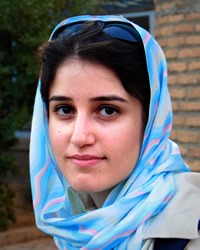Persian in Sweden

Photo Source:
Hamed Saber - Flickr
Creative Commons
|
Send Joshua Project a map of this people group.
|
| People Name: | Persian |
| Country: | Sweden |
| 10/40 Window: | No |
| Population: | 46,000 |
| World Population: | 48,380,900 |
| Primary Language: | Persian, Iranian |
| Primary Religion: | Islam |
| Christian Adherents: | 8.00 % |
| Evangelicals: | 6.00 % |
| Scripture: | Complete Bible |
| Ministry Resources: | Yes |
| Jesus Film: | Yes |
| Audio Recordings: | Yes |
| People Cluster: | Persian |
| Affinity Bloc: | Persian-Median |
| Progress Level: |
|
Introduction / History
By definition, Persians (also known as Iranians) are an ethnic group native to Iran. The Persian language, called Farsi, is part of the Indo-Iranian language family, and is the official language of Iran. Dari, the language of the elite in Afghanistan, is a dialect of modern Persian. Around 1000 B. C., Persian groups began to settle in the territory that is now Iran. Loosely associated Persian tribes became a more cohesive political unit under the Achaemenian dynasty. Their unity soon made them the dominant ethnic group in the region. For 1,200 years, Persia maintained a culture that became increasingly more complex and rigid. This laid the foundation for a successful Arabian conquest in the seventh century A. D. It was not until the Islamic revolution of 1979 that massive changes came both to Iran and to the Persian people.
Where Are they Located?
Although the vast majority of Persians now live either in Iran or in one of the nearby countries, small Persian communities can also be found in many other nations around the world including Sweden. Swedish Iranians/Persians consist of people of Iranian nationality who have settled in Sweden, also as Swedish citizens of Iranian heritage. They are one of Sweden's largest immigrant groups.
What Are Their Lives Like?
When Iranians first came to Sweden, many of them were initially trapped in poverty and welfare-dependency. Some young Iranians remain in the socially marginalized class that their parents were trapped in, but most have risen above this thanks to hard work, education and business savviness. At this point in time, Iranian Swedes are well-represented in higher education and in professions like dentistry and engineering. Becoming an engineer or a doctor is a common goal in many Swedish Iranian families. Young Iranians are encouraged to make their parents proud by earning a higher degree or founding a successful business.
What Are Their Beliefs?
Prior to the Arab invasions, the Persian religion was Zoroastrianism. This religion taught that there was an eternal struggle between the forces of good and evil. Shia Islam became the national religion of Persia in the sixteenth century, at which time the ulama (clergy) began playing an important role in both the social and political lives of the people. Today, most Iranians are officially Shia Muslims of the Ithna Ashari branch. However, the Iranians who have migrated to Sweden are usually disillusioned with state-enforced spirituality, especially in light of the hypocrisy which they saw in the Iranian government. For this reason, most are either Shia Muslim in name only or they are secularized.
What Are Their Needs?
Fortunately, being in a place where there is freedom of religion gives them a chance to hear and respond to the claims of Jesus Christ. The main obstacle is a lack of workers.
Prayer Points
Pray for a Disciple Making Movement to flourish among Iranians all across Europe. Ask the Lord to call and send out people who are willing to share the love of Christ with Iranians. Pray that God will raise up faithful intercessors who will stand in the gap for the Iranians. Ask God to strengthen, encourage, and protect formerly Muslim Iranians who have come to faith in Christ. Pray they will reach out to others.